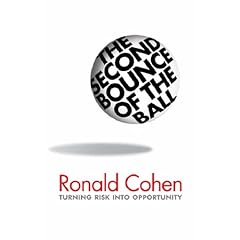
As managers what can we learn from one of the foremost figures in the venture capital world? Well, as it turns out a lot as Rohan Cohen's 'The 2nd Bounce of the Ball' proves.
Introduction
Ronald Cohen, pioneer venture capitalist, knows better than almost anybody else how to pick winners. He founded Apax Partners, which manages assets of $20 billion and has advised governments world-wide on the role of venture capital and fostering global enterprises.
Ronald has recently published ‘The Second Bounce of The Ball’ and in so doin
g reveals many of the secrets of his success – secrets that are relevant to every ambitious manager.
Many are called, but few are chosen
Cohen’s investment successes are no accident. He estimates that his company invests in just 2% of those early stage investment companies that it considers.
The decision as to which company to invest in requires hundreds of hours of due diligence, with 50 business plans being reviewed for every venture backed.
Question: Would your company fall into the 2% that are chosen for investment by Cohen?
The odds may be stacked against you
Even applying great care to selecting high potential companies, Cohen knows the odds of success are just 20%. Improving those odds is a constant focus, with his company becoming actively involved in supporting the mangers in those companies in which it has invested.
Interestingly enough, he puts the overall chances of an entrepreneur achieving something outstanding at about 0.4%.
Question: Will your company be in the small minority that can achieve something outstanding?
Cohen adds that buy outs give a more consistent overall return than earlystage investments.
How do you know if you are on to a winner?
Cohen’s view is that you can seldom do too much due diligence, yet he recognises that even those ideas that research identifies as winners are not guaranteed success.
Indeed, he suggest that you can never be more than 60-70% sure of success regardless of however much analysis is done and points to the importance of going to the market and getting reaction so as to really understand the chances of success.
Question: How much rigor do you apply to making key decisions in your business?
Not surprisingly Cohen is into business plans, yet he balances the need for clarity of direction with the need to allow for realignment, flexibility and ability to improvise as the company progresses.
Question: How agile is your business in response to changing market circumstances?
Calibrating risk and return: correctly defining which market you are in, how large it is, size etc - these are, according to Cohen, the fundamentals.
Key questions to ask
Here are some of the key questions Cohen applies to the selection of winning companies:
• How fast will it grow?
• How realistic and reliable are its projected revenue?
• How clear are the targets? How big is the vision?
• How realistic and controllable are the costs (development, marketing, sales, etc.)?
• What is the extent of competition?
• How protected are its margins?
• What is the commitment and skill in respect of sales and marketing?
• Are there barriers to competition/switching that protect its sales?
• How much is the CEO going to let go (to others)?
Question: Have you asked these questions of your managers?
The next bounce of the ball
Cohen is constantly looking at industry cycles to determine where and when to invest. In particular, in mature industries he is looking for ‘the next bounce of the ball’ – emerging markets that has the potential for rapid growth. This isn’t easy however, calling for a real understanding of the market and the ability to recognise trends and the cycles.
Question: Where is the next bounce of the ball going to be in your industry? Are you positioned to take advantage of it?
It will take longer than you expect
Cohen has regrets. The first is that the European Venture Capital Industry did not develop like its counterpart in the US. As a result many of Europe’s rising stars don’t have the capital intensity required for global success.
Technology creates a high level of uncertainty Cohen observes, not least because products take time to develop. All too often there is insufficient capital to ensure success.
His advice is to raise enough capital – at stage one raise enough money to get to stage 3, at stage 2 raise enough to get to stage 4. In particular first round finance, he suggests, must be sufficient to achieve lift off and requires the investment to take you to at least year 2.
Question: Do you have the resources of scale?
Being practical he suggests that it should be enough to get to the point of profitability, but points out that that is secondary to getting to the point of scaling the opportunity.
Investing means gambling on the people
Key to the success of any company is the management team. Here is what Cohen looks out for in winning companies:
• An inspiring but realistic vision – the business will grow to match size of vision.
• The CEO – he / she has to be able to delegate and let go, to be realistic, as well as visionary and to avoid his/her ego getting in the way of judging reality.
• The present skills level of the management team (sectoral expertise, technical and creative skills), or ability to attract good people
• The management team has to have meshed together, with the time the team has been together being really important
Question: How do you and your team rate on these scores?




No comments:
Post a Comment